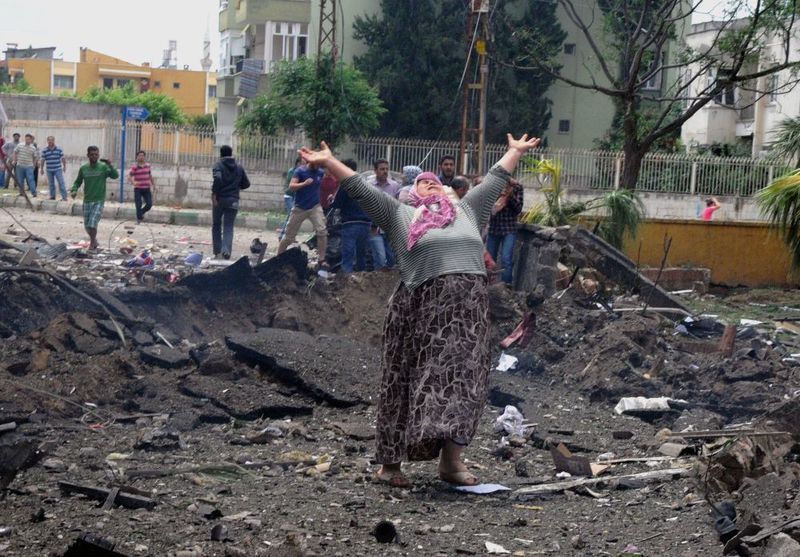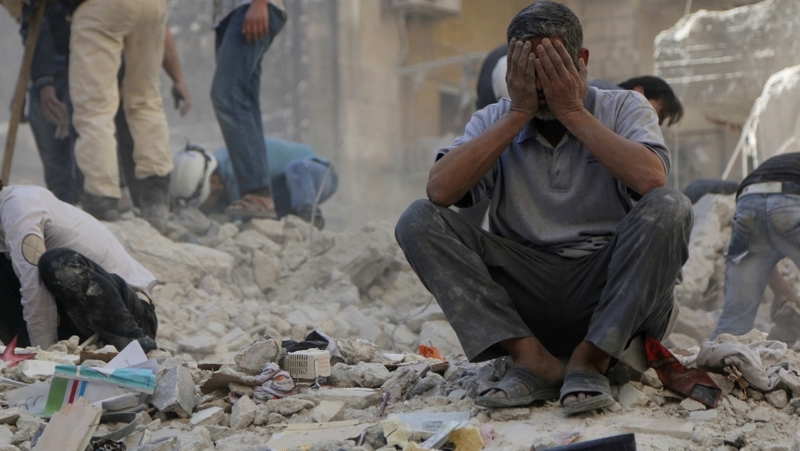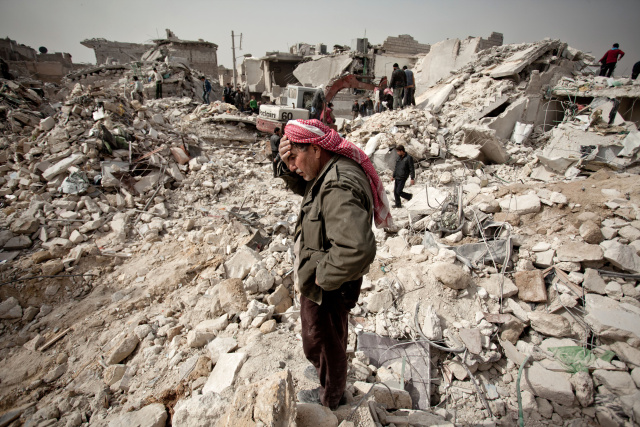Syria is now the biggest threat to Britain’s security
THE DAILY TELEGRAPH
The crisis in Syria has emerged as the biggest threat to Britain’s security, The Telegraph can disclose.
The threat to the UK from returning fighters from the Syrian civil war is now the same as that from al-Qaeda terrorists in the borderlands of Afghanistan and Pakistan.
The increased risk will refocus attention on the decision by David Cameron – backed by MPs in the House of Commons – not to intervene as the Syrian conflict worsened last August.
For the past two years, British jihadists have been able to gain access bomb and weapons training as well as further radicalisation.
There are fears that British men who have been radicalised there are also being encouraged to return to the UK to carry out attacks here rather than staying to fight.
As many as 500 Britons have headed to Syria to fight in the past three years – far higher than the numbers who travelled to Iraq.
The police and security services are understood to be monitoring around half of that number who have returned. Some arrests have been made.
A senior Whitehall source told The Telegraph: “We are seeing a growing threat to the UK from terrorist groups in Syria.
“The threat to the UK comes from a range of countries and groups but Syria is perhaps the biggest challenge right now.”
Confirmation of the escalating concern was made by an additional paragraph to the Government’s assessment on the threat from foreign fighters published on the Security Service’s website.
It says: “Over the last two years, we have seen Syria become an attractive destination for UK extremists wishing to engage in violent jihad.
“The nature of the conflict in Syria and the emergence of the Al Nusrah Front, which has declared its allegiance to Al Qaeda leader Ayman al-Zawahiri, is leading to the country becoming an increasingly significant potential source of future threats to the UK and UK interests overseas.”
Syria is seen as a major threat because of the culmination of a number of aspects that the UK has not faced from one single place before.
Its proximity to Europe makes it easier and cheaper for would-be Jihadists to head there and does not appear as “foreign” as the once-Al-Qaeda strongholds of Afghanistan/northern Pakistan and Somalia or Yemen
Monitoring of terrorists in Syria by British intelligence agencies is made more difficult because of the ease with which they are able to move around the country.
Syria was identified as the “most significant development in global terrorism” in the Home Office annual review of its counter-terrorism strategy Contest this week.
In the foreword to the review, Theresa May, the Home Secretary, said: “We witnessed an unprecedented concentration of the terrorist threat in and from Syria, even as we confronted threats emanating from other countries where it is equally difficult for our nationals security agencies and departments to operate.”
The review went on to warn: “Dealing with terrorism in Syria is a very significant challenge due to the numbers of people fighting with the many Syria based terrorist groups, their proximity to the UK, ease of travel across porous borders and the ready availability of weapons.
“We are concerned about the threat to the UK from Syria based groups and the threat from foreign fighters returning to this country.”
Syria takes up a large proportion of MI5’s international counter terrorism work. Last year Charles Farr, the Home Office’s anti–terror chief, said Syria had become a “game changer”.
Last year the Prime Minister described some of the rebels against President Bashar al-Assad’sregime in Syria as “extremely dangerous terrorists”.
He said: “My concern is that the current trajectory in Syria is very, very damaging. “You have got a dictator who is brutalising his people, who’s using chemical weapons against innocent people.
“You’ve got an opposition elements of which are extremely dangerous extremist terrorists.”
Commenting on the news, ODFS Director, Ribal Al-Assad said:
“As I have repeatedly stated, the threat posed to the West by foreign Islamist extremists returning from Syria is paramount – these people are both fanatical and dangerous, they will stop at nothing to achieve their perverted aims.
Michael Morell, the outgoing Deputy Director of the CIA, stated last August that Islamist extremists returning from Syria pose the greatest threat to U.S National Security; geography suggests that the threat must be exponentially higher in Europe.
Why has it taken 9 months for the U.K. to realise the gravity of the situation?
The international community must get a grip on this problem, we have already seen the potential for ‘lone wolf’ attacks in home nations and the reality is, that a major incident could occur if robust action is not taken soon. No Islamists should be able to travel to Syria for any reason and as I have stressed time and time again the West must not arm the Islamist rebels.
Congressman Michael McCaul, Chairman of the House Homeland Security Committee, estimated the proportion of extremists in rebel factions at 50%. A study last year by the defense consultancy IHS Jane’s estimated that of 100,000 ‘opposition’ troops 75% are of a Jihadist or Islamist nature. It believes the total force is split into as many as 1,000 separate bands; it is uncontrollable and extreme.
In addition many others have come forward with damning evidence that the rebel movements are mainly comprised of terrorist elements.
The US Secretary of Justice, Eric Holder, has categorically stated that most of the Free Syrian Army follows the Al Qaida ideology. Similarly the head of the independent UN investigation, Mr Pinheiro, stated that none of the rebel groups were fighting ‘in the cause of democracy’. Thomas de Maziere, Germany’s top security official, has previously suggested that the number of Islamic extremists traveling to Syria is “extraordinarily high”.
We can be sure that there is absolutely nothing remotely ‘moderate’ about these rebels.
As US Army General Lloyd Austin III put it in October:
“The conflict in Syria cannot and will not be resolved militarily, and this sentiment has been universally shared by every leader that I’ve talked with in the region.
All agree that an end to the conflict will require a diplomatic or a political solution, and until such a solution is achieved the fighting will continue and more lives will be needlessly lost.
Left unchecked, the spread of violence and terrorist activity emanating from Syria could result in a long, drawn out conflict that extends from Beirut to Damascus to Baghdad to Yemen.”
So why is the West, when it has all these facts at its disposal, not only supporting but arming rebel movements?
The international community must look at the facts, there is only one solution here and that is the diplomatic one.
The only way to achieve a lasting peace is for the International Community to support an all-inclusive, political transition, by bringing together all opposition groups who genuinely believe in democracy and freedom and are willing to commit to it.
As I have said again and again, it is time for a new approach to Syria – one that will bring about an end to the conflict, not inflame it.
In the mean time, the threat of Islamist extremists to the world continues, let us not be complacent – this issue needs to be confronted head on.


